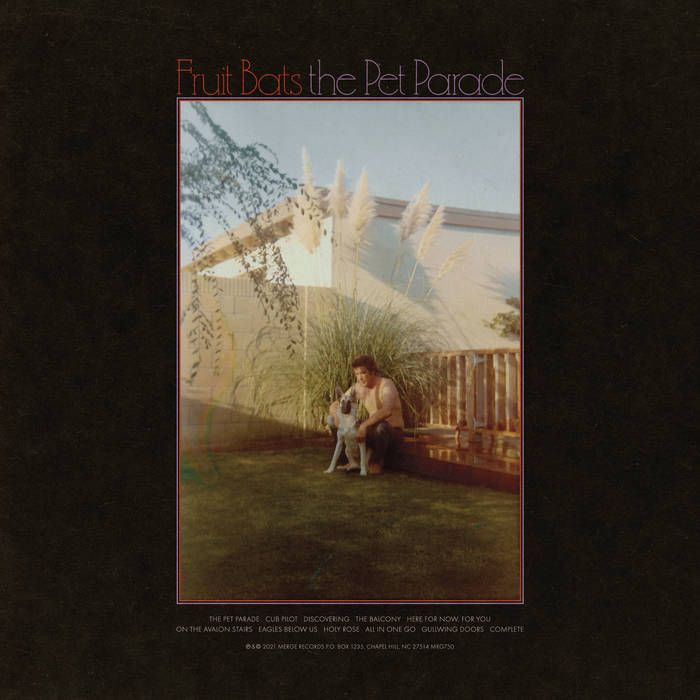Fruit Bats’ ‘The Pet Parade’ is a timely contemplation of isolation and existence

Fruit Bats
The Pet Parade
Merge · March 5, 2021
The Pet Parade is the eighth studio album from Eric D. Johnson’s indie folk-rock project, Fruit Bats. Johnson named the album and its titular track after the wonderfully bizarre pet parade outside of Chicago that he attended with his grandmother as a child. From this memory, he explores what he describes as “living within the beauty and absurdity of existence.” It isn’t surprising that the track originated from a memory, as the six-and-a-half minute tone poem evokes strong feelings of being drawn back to a familiar yet distant past.
Johnson’s experience as a guitar player and vocalist are evident in his songwriting and composition. At the ends of phrases, the guitar matches the sustained note of the vocals before shifting it into the next line and chord. This coordination and playful relationship between the guitar and vocals are the most prominent characteristics of Johnson’s style. Another feature of his style is his distinct vocal timbre. Johnson’s tone embodies his stylistic influences, as it reads solidly folk-rock and occasionally resonates as distinctly ‘70s.
The fourth track, “The Balcony,” brings a much-needed injection of energy. The song describes the idea of finding yourself on the balcony waiting for spring. It is named after a place in his grandmother’s house but operates as a metaphor about patience. The transition into the next track is a little harsh, as we shift from the chaotic melodica solo of “The Balcony” into the sparser “Here For Now, For You.” This track centers around love and accepting that even things that feel permanent cannot last forever. Johnson writes, “This world, you know it’s hard, cause everybody’s gonna leave you eventually / But you know that I’m here for now, for you.”
Many of the tracks were written before COVID-19, yet they aptly explore the themes of connectivity and isolation that are unequivocally relevant to current times. Although Johnson is currently the only official member of Fruit Bats, he brought in several other talented instrumentalists for the album – notably pianist Thomas Bartlett (Doveman) and fiddler Jim Becker (Iron & Wine). Similarly representative of the times, the artists had to self-record their parts in their bedrooms and home studios. Luckily, this fragmentation does not leach into the final product, as the songs still convey an incredible intimacy. This is largely due to the masterful blending and collation executed by producer Josh Kaufman.
There is a certain sameness that envelopes the record, but the layers and compelling lyrics manage to keep this dreamy echoing from becoming dull parroting. There is not a single notably weak track on the album, which is no small feat. Some tracks that stand out and demand extra attention are “Holy Rose” and the closing track, “Complete.” The former was written about the 2017 Tubbs Fire in Sonoma County, which destroyed the childhood home of Johnson’s wife. This song features greater conflict and dissonance between its parts than other songs on the album. The electric guitar and composition are more grounded in rock than in folk.
The final three tracks are where Johnson’s sincerity and narrative strength truly shine. This intentionally sequenced closing trifecta – “All in One Go,” “Gullwing Doors,” and “Complete” – is emotional and serves as a strong conclusion to the themes of love and loneliness that Johnson explores in the rest of the album. In “All in One Go,” he writes: “When you’re stuck in amber, do you remember anything? / These days it’s hard to tell dreams from remembering / But then it all comes to you, all in one go.” Utilizing warm harmonica and tender piano to build a wistful feeling, Johnson once again captures a familiar feeling that, like the track, is over just as quickly as it began. “Gullwing Doors” was named after the vertical doors featured on cars like Back to the Future’s DeLorean. Johnson uses this image to describe the skies he saw on his long drives between L.A. and Portland and as a simile for opening one’s heart. These contemplations lead into the declarations of the final track.
“Complete” is the most intimate track on the record. Johnson counts off into the song’s stripped composition featuring only vocals and guitar. He describes the harmful comparisons people make between their lives and those around them: “Some people look like they have peace / They only pretend their life’s a peach…But you shall be complete / You shall be complete / I decree it so.” Although the track is written in second person, its repetition feels like it may be Johnson trying to promise this to himself, casting away the doubt and forlorn feelings featured in earlier tracks.
The Pet Parade’s contemplation of connectivity and isolation could not have come at a better time. Johnson’s explorations of loneliness and the bizarre beauty of existence will undoubtedly become the soundtrack for others’ long drives and introspection. This track marks 20 years of the Fruit Bats project – off and on – and Eric D. Johnson’s compositions remain emotional and compelling.